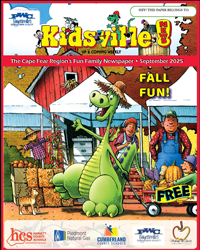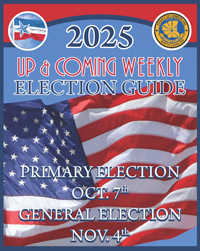Home
Media Puts Negative Spin on Bragg/Fayetteville Image
- Details
His life has given him a perspective on the community, its people and their relationship to Fort Bragg that many do not have. Over the past several weeks, as a spokesman for Fort Bragg, he has used that perspective to try and tell a balanced story about our community, its problems and its strengths.
McCollum has spent much of his time over the past several weeks talking about the recent murders of two Fayetteville soldiers — Holley Wimunc and Megan Touma. He has also been listening to the voices of the Fort Bragg community, and what he has found hasn’t been fear, but rather a strengthening of a bond in the community.
“In reality, military wives don’t need to be frightened,” he said. “These are isolated incidents that appear to be domestic dispute based. Domestic disputes happen in any community.”
He noted that the community has a great concern for the stress placed on military families, noting that when one member of the family deploys, the other spouse is left carrying the load of the home, but also operating under the stress of a lack of sleep and a lack of someone to carry the burden. “It can become overwhelming,” he said. “That’s why we have a number of programs at Bragg to help them deal with that stress.”
He added that many of those programs work in concert with city and county agencies. “People don’t have to be on Fort Bragg to get assistance,” he continued. “About 75 percent of our married couples live in Fayetteville.”
Both national and local media have tried to find a tie to service in the military and violence, with some media outlets suggesting that violence perpetrated by soldiers has become a drain on the community. “Years ago the Observer did a study that found that the majority of crime is not perpetrated by, but more directed towards them (the members of the military),” he noted. “It’s not an us/ them situation. We are all one community, and it doesn’t matter who starts it, what matters is how we fight it.”
He said the key to fighting violence, particularly domestic violence, in our community is being aware of the problem and the resources available to help those who are victims of domestic violence.
“If you think you have a problem with violence in your relationship, you have to take care of it before a hand is ever brought across the face. You have to back away from the situation and get help,” he said.
Fayetteville Mayor Tony Chavonne has also had a tough few weeks. He sees the presence of the military in the community as a blessing, not a problem.
“We are blessed to have these young men and women in our community,” he said. “They are the sons and daughters of America. The stress level in our community is not unique to Fayetteville. These deaths are tragedies, but it is an unfortunate coincidence coming so close to each other. Everyone is trying to make a connection, because it makes it more newsworthy.”
He noted that while many are painting Fayetteville in a negative light, the facts simply don’t support that portrayal. Fayetteville’s homicide rate is lower this year than last. Crime overall has decreased over the past year. “We are making great progress,” he said. “People are happy here, we are creating a more attractive, clean and safer city. People are excited about what is happening in our community. It is our responsibility to provide an environment where people can feel safe.”
He said that one of the biggest problems with the portrayal of the city in recent weeks by the media has been the media’s lack of interest in getting a true picture of our community. “The media is sitting around, waiting for the next news cycle, and ignoring the dozens of people who are walking by them. They don’t ask those people about their lives. They don’t recognize that the people they are portraying as violent could have been building a school, providing water or ensuring a democratic vote in a foreign country over the past year. Those stories are getting lost.”
He noted that that was not unexpected. “We can’t be set back. Our mission is to move our community forward. We can’t be frustrated or surprised by their reports — we have to look at how we respond. We can’t just celebrate our soldiers upon their return — we have to work through all of these challenges as a community.”
Chavonne noted that the media is trying to paint the soldiers as being inherently violent. “I don’t buy into that, and I don’t think most people do. The people I know who I’ve met who have served with multiple deployments come back with a greater appreciation of life,” he said. “If you knew these people — went to school or church with them, you would recognize the great love and appreciation they have for things we take for granted.”
While many people try to define the community as separate — either members of the military or local residents — local leaders and members of the community recognize that there isn’t a line that separates the two.
“Military communities have unique relationships,” said Chavonne. “We are blended. The great strength of this community is its relationship with Fort Bragg.”
“There’s really no way to separate the two,” added McCollum. “The families are blended. It’s no longer a case of townies vs. the military. It is rare to find a family in Fayetteville that doesn’t have a relative in the military — even in the most established families, the ones who have been here since the 1700s. There is a co-dependency between the two. Fayetteville depends on Fort Bragg for its economy and Fort Bragg depends on Fayetteville for its quality of life.”
The problem comes into play, both men agreed, when people choose to look at Fayetteville in the light of its Vietnam-era reputation. They pointed out that the moniker Fayettenam is long gone, but when Fayetteville gets national media scrutiny it is that picture that is imposed on the community.
“Do we have a bad rep?” questioned McCollum. “Yes. Is it justified? No. It’s from people who have not spent time in this town, people who won’t take the time to come in here and take a look at it. It’s easy for people to fall back to stereotypes. This is the time for people to see our community standing shoulder to shoulder as we always have.”

 How to resolve AdBlock issue?
How to resolve AdBlock issue? 









